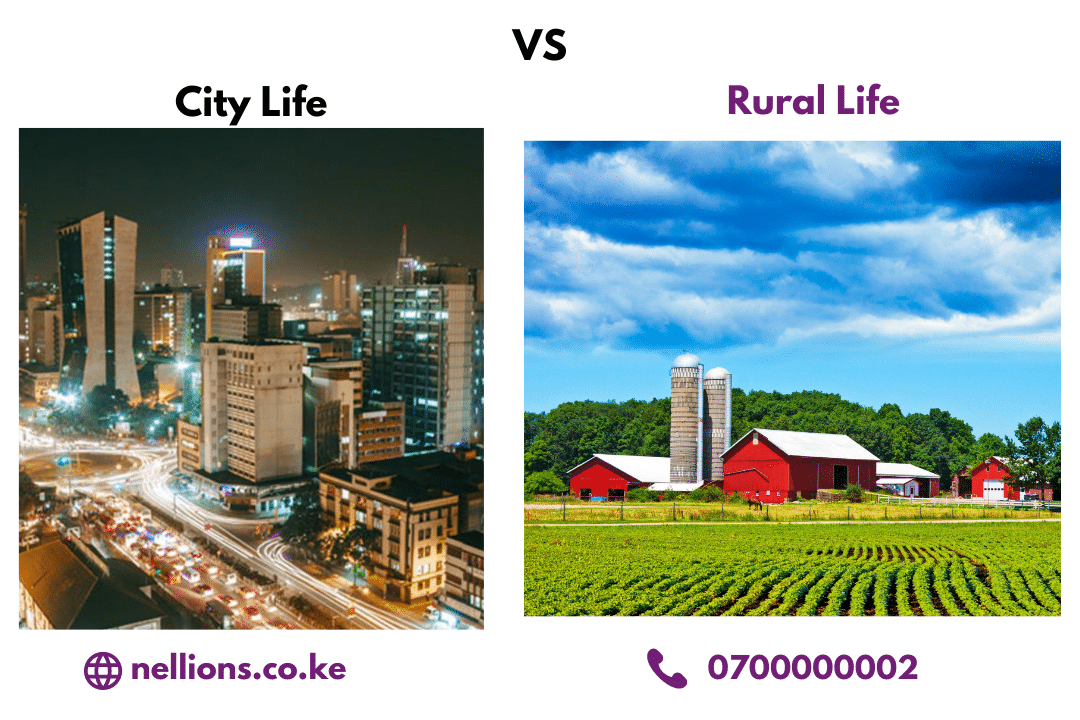Moving from the city to the village and vice versa is quite the transition and can present a culture shock. The differing ways of life that each offer has their own perks, and in this article, we explore what you can expect when choosing between city life vs rural life
First off: why make the move?
Reasons for moving from rural to urban settlements/from urban to rural settlements
- Lifestyle Modification
It might be tough to decide to relocate completely. Being dissatisfied with your current surroundings is a typical concern. Many individuals feel the desire to move to a larger, more appealing property in either the city or the countryside.
With the importance of reporting to the office daily diminishing during these times of the pandemic, we have witnessed a lot of clients moving to the village from the city and citing it as the reason.
- New Job
A new job may necessitate transferring to a different location if the commute is simply too long, or if traveling from your existing house to your new employment is utterly impractical.
- Empty nest
When the children have grown and moved out of the family home, many people want to relocate to quieter locations, such as rural locations, and build their retirement homes.
- The cost of operating a home
Many people prefer to relocate to a region where the running costs of a property are substantially cheaper due to a change in income or the desire to save money. The cost of owning and operating a home, from the purchase price to rent or expenses, might motivate many people to relocate to a new place.
- Changes in the surrounding environment
The neighborhood may have deteriorated dramatically since you moved into your present house for economic, social, or physical reasons. This may imply that you desire to migrate to a location where you are considerably happy and more at ease.
City life and Rural life are very different in their entirety and each has its advantages and disadvantages. Either may be suitable to you depending on personal conditions that apply to you.
City Live over Rural Life
A lot of people in the prime of their lives prefer living in cities for these reasons:
Job Opportunities
With businesses on every corner, it’s easy to find work here, yet it may be difficult to find one that caters to your high rent. A city full of businesses is a city rich in job options. There’s a good chance you’ll find one that you qualify for. Persons in major cities have more job prospects than those in the suburbs or smaller towns.
Larger Salary
Employers are frequently prepared to pay extra despite the high cost of living in the metropolis. This is why many middle-class people travel to the city to earn a greater wage while yet enjoying lower housing prices in their smaller towns. Some employees may choose to relocate to the city rather than endure the daily commute.
Access to Social Ammenities
While living in cities, it is easy to access schools, hospitals, gyms, malls, transport services, and other social amenities. At every corner, one of these will be available because of the much-developed infrastructure that allows you both educational and health benefits and a chance to interact with the community and meet a credible network of people.
Personal Growth
One thing that may be quite reassuring in a huge city with different people from all walks of life is that everyone is having the same experience of living there. Big cities are more inviting than many people imagine, and if you visit the same areas and participate in the same activities, you will rapidly meet new people who share your interests and have likely moved to the city. Your personal growth will be achieved in this way as you interact with different people and learn new things.
Disadvantages of living in cities
City Life does have its disadvantages. The hustle and bustle come with their toll on the people who live within the metropolitan and are constantly around this commotion.
High Cost of Living
Everything is much more expensive in the city, ranging from the monthly rent to be paid, transport costs in and around the city, even health services cost more. Daily needs such as food and sanitation product also have an increased cost which dents your monthly budget considering most homes in the city buy every food item.
High Crime Rate
Some cities will have greater crime rates than others, but these urban regions will always be more hazardous than smaller communities. A more populated area is more likely to have crime.
Increased crime rates increase security rates as a result of auto theft and damage, burglaries, and vandalism.
Noise Pollution
The noise level in larger cities is often higher than in the suburbs. Cities have more people and traffic, which contributes to noise, as do trains and neighboring airports with noisy planes going in and out. Special events, such as concerts and baseball games, can sometimes make a neighborhood more noisy and congested. This might be harmful to your health in the long run.
High-Stress Level
Busy towns or cities might feel congested, which can lead to feelings of tension or pressure. This also comes as a result of constantly needing to be on your feet and alert to meet the monetary requirements that come with living in a city. In metropolitan locations, you may not be able to build such close-knit groups of people to share these struggles with and some people end up depressed.
Rural Life over City Life
If the disadvantages of living in the city are too much for you to handle, you may consider relocating to the suburbs as this provides a quieter, more relaxed lifestyle. Other advantages are:
A Cleaner and Peaceful Environment
Suburbs will include communities with homes clustered together, as opposed to the crowded sense of the city, where commercial and apartment spaces are mixed into one structure. Instead of playing on the pavement or walking to a public park, your children may play right outside your house. There won’t be nearly as many automobiles passing by as there were in the city.
Reduced Cost of Living
In rural areas, most people grow their food and avoid the cost they would incur in the purchase of vegetables. however, if you opt to buy food, the prices are quite cheap since the supply is high. Transport and living costs are generally low and you would save a lot of money compared to living in the city as you can get a much larger house for a lower price than you would in the city.
Slower Pace
In the countryside, you can accomplish everything at your leisure without having to worry about stuff getting in the way. Rush hour still exists – certain locations are worse than others – but you’ll feel the difference if you’re moving from the large metropolis.
A Better Sense of Belonging
Because fewer people live in country villages and rural regions, buying a house in these places will allow you to become part of a tighter community, and individuals who live in small towns and villages frequently mention the community feels like one of the reasons they prefer living rurally.
Enhanced Well-Being
Being more linked to nature may have a very significant influence on your wellness, assisting in the improvement of your quality of life.
Rural properties are often larger and have gardens, making them perfect for people raising big families. Countryside people are surrounded by environment and wildlife, making it significantly simpler to get back to the fundamentals of life.
Disadvantages of Rural Life
This life also has its disadvantages, which include:
Fewer Amenities
While the suburbs have greater space for everything, there are fewer facilities since everyone is scattered. As a result, fewer public transit options, schools and institutions, and hospitals might make things more difficult.
Lack of Public Transport
Unfortunately for most people, many suburbs lack public transit; having a car is expected to move about.
Owning a car may also be costly due to the costs of gasoline, maintenance, insurance, and the vehicle itself. Also, keep in mind that your commute will most likely be lengthier, requiring you to wake up earlier.
Fewer Job Opportunities
Rural towns often have fewer work opportunities due to their small size and cheap cost of living. Jobs in the area are likely to pay less than those in larger cities. However, if you can work remotely, are your employer, or are retired, this may be less of an issue.
Maintenance of Property
You may have more room in a rural setting, but it also means you have more responsibilities. A larger property will require more regular cleaning and upkeep than a small unit. If you own land, you’ll have to devote much more time, money, and effort to property maintenance.
Fewer Businesses
Since there are fewer people, there are also fewer businesses to patronize. This implies you may have to drive outside of town or pay more money to obtain all of the items and services you require.
It is just as crucial to finding a moving company as it is to find your future residence. Moving to a new setting is stressful enough; the last thing you need is for your valuable possessions or even your new house to be harmed in the process. After considering the facts laid above, we advise you to contact a reliable moving company to help with your transit.













